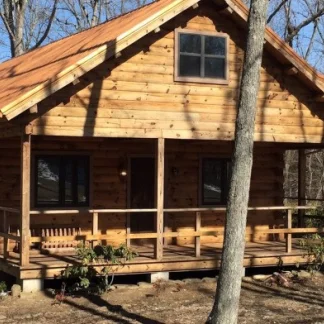Volunteer Behavioral Health - Cumberland Mountain Mental Health Center
Volunteer Behavioral Health - Cumberland Mountain Mental Health Center is locate...
Cumberland Heights, in Crossville, Tennessee, provides comprehensive, 12-step-focused addiction recovery services for adolescents and adults, including telehealth care and inpatient, intensive outpatient (IOP), general outpatient (OP), and aftercare programming. Gender-specific and dedicated services are available for adolescent boys, clients with hearing impairments, and clients with co-occurring addiction and mental illness. They are state licensed and accredited by The Joint Commission and NAATP.
Cumberland Heights offers comprehensive medical and mental health assessments, personalized care planning, and complete case management.
Their inpatient programs are designed for clients requiring the highest levels of supervision and support, including those in early recovery and those at an elevated relapse risk. Their gender-separate residential treatment centers feature an inviting, home-like environment and premium amenities, including a wooded setting with courtyards, gardens, and hiking trails. Clients engage in intensive individual, group, and family counseling and robust, gender-specific life skills training addressing topics such as coping, self-care, and relapse prevention.
Their outpatient programs offer multiple levels of care to align with clients’ evolving needs. Aftercare services may include step-down support, 12 step program facilitation, peer coaching, and referrals for medical, mental health, and social service programs.
Cumberland Heights contracts with more than 25 major insurance providers, including Aetna, BlueCross BlueShield, Beacon, Anthem, United Healthcare, and others. Out of network benefits vary. Contact your provider to confirm coverage.
Contact us for more information: (931) 250-5200

Connect with Cumberland Heights by calling their admissions team directly.
(931) 250-5200 Website Get DirectionsThe Joint Commission, formerly known as JCAHO, is a nonprofit organization that accredits rehab organizations and programs. Founded in 1951, the Joint Commision's mission is to improve the quality of patient care and demonstrating the quality of patient care.
Joint Commission Accreditation: Yes Accreditation Number: 3395
The National Association of Addiction Treatment Providers (NAATP) is a professional association that represents organizations in the field of addiction services. Founded in 1978, NAATP's mission is to advance addiction services and ensure that high-quality addiction treatment is available and accessible.
NAATP Member: Yes Member ID: 10750
State Licenses are permits issued by government agencies that allow rehab organizations to conduct business legally within a certain geographical area. Typically, the kind of program a rehab facility offers, along with its physical location, determines which licenses are required to operate legally.
State License: Tennessee
Research clearly demonstrates that recovery is far more successful and sustainable when loved ones like family members participate in rehab and substance abuse treatment. Genetic factors may be at play when it comes to drug and alcohol addiction, as well as mental health issues. Family dynamics often play a critical role in addiction triggers, and if properly educated, family members can be a strong source of support when it comes to rehabilitation.
Group therapy is any therapeutic work that happens in a group (not one-on-one). There are a number of different group therapy modalities, including support groups, experiential therapy, psycho-education, and more. Group therapy involves treatment as well as processing interaction between group members.
Group therapy is any therapeutic work that happens in a group (not one-on-one). There are a number of different group therapy modalities, including support groups, experiential therapy, psycho-education, and more. Group therapy involves treatment as well as processing interaction between group members.
Volunteer Behavioral Health - Cumberland Mountain Mental Health Center is locate...
Hilltoppers – Group Home is a private rehab located in Crossville, Tennessee. Hi...
Spero Health – Crossville is a private rehab located in Crossville, Tennessee. S...
Fourth Dimension is a private rehab located in Crossville, Tennessee. Fourth Dim...